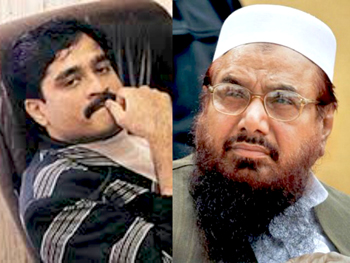New Delhi, Sep 7: Union minister Rajyavardhan Singh Rathore on Sunday said that country's enemies like Dawood Ibrahim and LeT chief Hafiz Saeed should not believe that India is not "thinking" anything about them.
 "We always remain ready to neutralise our enemy," Rathore said when asked what the government was doing about Ibrahim, the main accused in 1993 Mumbai blasts, and Saeed, who is wanted in India.
"We always remain ready to neutralise our enemy," Rathore said when asked what the government was doing about Ibrahim, the main accused in 1993 Mumbai blasts, and Saeed, who is wanted in India.
"India’s enemies, wherever they are based, must never be under the delusion that India is not thinking about them. We are always ready to neutralise our enemies," Rathore said on TV channel Aaj Tak's 'Seedhi Baat' programme.
It was pointed out to him that 15 months of Modi government have passed but nothing had been done with regard to fugitives taking shelter in Pakistan, except for preparing a dossier.
He said India had not just prepared a dossier (for Pakistan) but was ready to use other options as well. "Saam daam dand bhed, sab cheezon ka istemaal hoga. Dossier bhi denge aur baaki sab kuch bhi hoga (Every option will nbe used. We will send a dossier and all other options will also be used.)
Asked whether there could be any covert operation, the minister who was formerly a Colonel in the army, said, "We may do it but there will be no publicity before that. After the operation, there may be or may not be. It depends on whether the government says it should be 'covert operation' or a 'special operation'.
He said a covert operation may never be known but information about a special operation may be given after it is done.
"A special operation is made public after it is done. It depends on the government as to when to do it.... Who knows it may be happening now or not happening now but it will be made public only after it is done," Rathore said.
Indian security agencies have documents to prove Dawood, wife Mehjabeen Shaikh, son Moeen Nawaz and daughters Mahrukh, Mehreen and Mazia are based in Pakistan with the syndicate chief currently operating out of upscale Clifton neighborhood of Karachi. The agencies are in possession of an April 2015 telephone bill in the name of his wife Mehjabeen with D-13, Block-4, Karachi Development Authority, Sch-5, Clifton, as the installation address.
Interpol has a red corner notice, or an international arrest warrant, out against Dawood and a host of his associates for their involvement in the 1993 serial blasts that killed more than 257 Indians and injured hundreds more.





Comments
Add new comment